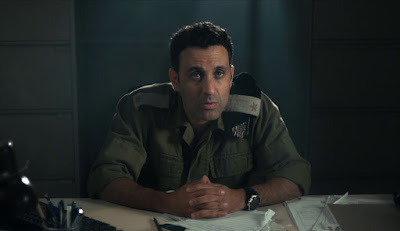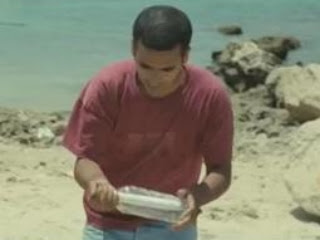It has been but two months since the most recent and marvelous Israel-and-Palestine movie --
The Other Son from
Lorraine Levy -- opened in the U.S. Now comes the second such --
A BOTTLE IN THE GAZA SEA -- and it, too, is from a French filmmaker. Some distance -- physical, and perhaps moral and emotional -- coupled with great empathy and skill, it seems, enables these filmmakers to address a subject so fraught with history, anger, hope and peril that you'd have to be a little crazy to want to get near it.
Like Levy's movie, "Bottle" (directed and co-written (with
Valérie Zenatti) by
Thierry Binisti, who is shown at left) takes off from a striking premise: The film opens with a terrorist attack in Israel, unseen but heard against the black screen. We see but a brief moment of the result of this attack before we begin to be immersed in the life of a French/Jewish high school girl, Tal, who has moved with her family to Israel, where her brother now serves in the Israeli army and has agreed to toss a sealed bottle with a message written by his sister into the sea. And yes, while the "message-in-bottle" movie is old hat, setting it in Israel/Palestine makes it live anew. (This was also quite true of the premise of
The Other Son.)
No sooner have we heard this premise than we begin imagining the outcome. Sure, the bottle will be found by a Palestinian (the fellows above, as a matter of fact) and thus set up an immediate "dilemma" leading to what? A kind of middle-east
Romeo & Juliet? Yet this premise of
Bottle turns out to be a great one in the hands of these filmmakers because nothing is imagined nor played for simple cliché and easy accommodation.
This is tricky territory, trod many times already but rarely, as is also true with
The Other Son, so well.
What makes this movie so special is the care it takes to keep its characters real -- at the same time as it continues to probe the situation around them, both familial and national -- while keeping open the lines of communication between the two. And isn't open communication, despite a continuing barrage of horror, one key to solving seemingly insoluble territory/occupation disputes, whether they be in the Middle East or Ireland or Quebec?
So much is going on above and below the surface of this movie that we cannot help but be riveted. And the fact the M. Binisti bites off approximately as much as he can (and does) chew is of immense help. This
Bottle is a love story of sorts, but no more than it is a family story -- two families, two nations -- and the writers/director keep their story well-proportioned, with loose ends tightened up only as much as reality might allow.
All the performances are fine but it is the two lead actors who bring the film to fruition:
Agathe Bonitzer's Tal (above) is somewhat mature for her 17 years but full of life and hope and questions, while
Mahmud Shalaby's Naïm (below) is initially angry and provocative as the Palestinian young man (he's only 20) who is slowly made aware of some possibilities -- and yes, these are not perhaps probable but they
are possible -- for change in personal status, as well as the larger picture. These two are just smart enough and naive enough to be quite real and affecting.
Mister Shalaby, by the way, is a much more versatile actor that you might realize, as he also played the brother of one of
The Other Sons, as well as that sexually-troubled singer in
Free Men. He's an actor to watch -- for all kinds of good reasons. In the supporting cast, most recognizable to me are the always fine
Hiam Abbass as Naïm's widowed mother (shown at bottom, left) and
Jean-Philippe Écoffey as Tal's father (at right, below).
Full of small bits of surprise that could, under other circumstances, bring its people closer, but here would more likely separate them further, the movie is remarkably nuanced in the treatment of characters and the connections that bind or break them.
A Bottle in the Gaza Sea, another first-class film distributed by
Film Movement, opens in New York City this Thursday, January 3, at the
JCC, and on Friday, January 4, at the
Quad Cinema. I would hope other venues around the country will be forthcoming. Click
here to see any currently scheduled playdates, with cities and theaters.
















































.jpg)


.jpg)






